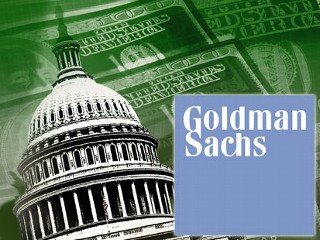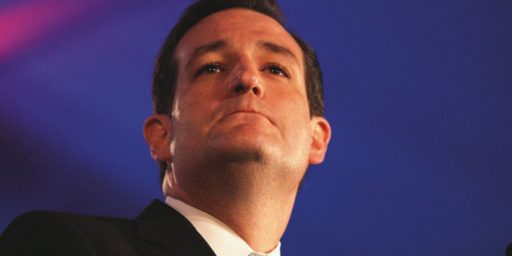Some Cruzian Chutzpah
This struck me this morning listening to Weekend Edition:
Behind the scenes, Heidi Cruz has been busily fundraising for her husband for months. She took a leave of absence from the investment firm Goldman Sachs to work on the campaign.
That connection has been a source of criticism for Ted Cruz, who was elected to the Senate in 2012 as a Tea Party conservative and a critic of the federal bailout of Wall Street.
The scrutiny intensified after it came to light that Cruz had used loans from Goldman Sachs and Citibank to fund that campaign. In an interview, Heidi Cruz said she doesn’t see a contradiction.
“Ted and I were both against the bailouts, but not against Wall Street, not against any industry,” she said. “We are against government intervention into the industries in this economy.”
Given a) the culpability of firms like Goldman Sachs in creating the Great Recession, and b) the aid that such firms received from the federal government, such statement are hard to take. And yes, I understand both the ideological and political impulses behind the statements. Still, there is some special mixture here of Tea Party anti-bailout rhetoric mixed with financial support from those bailed out that is impressive (in a certain sense of the term).
In particular I find the notion of being against the bailouts and being for Wall Street to be a remarkable bit of mental gymnastics (although, again, ideology is clearly at play here).
(And before anyone mentions it: neither of our major parties is untainted by hypocrisy on this topic).






The whole structure of Wall Street can not exist without the umbrella of the government shielding them in a thousand different ways and acting as the ultimate provider of a safety net. I don’t object; a complex society must have a mechanism to generate investment, and the investment intermediaries deserve an income for their efforts. I am concerned by the extreme closeness of GoldmanSachs with the government. Many Secretaries of Treasury and Chairs of the Fed have close ties to GoldmanSachs. Regulatory capture is not just a theoretical concern. I would have preferred that Mrs. Cruz would have said, “Yes, the government bailed out our company. What do you think our guys on the inside of government and the huge campaign dollars we give are for?”
Sen. and Mrs. Cruz strike me as being sort of like Nicholas II and Alexandra: oblivious to the volcano on which they were sitting.
@Slugger: Yes, Wall Street is dependent on the government to maintain a stable ecosystem. And for that, they pay their taxes.
There’s no contradiction in saying you support Wall Street and you oppose the bailouts. I want our financial system to be independent from the government as much as possible, and that includes not giving the government even more strings to pull — we’ve all seen plenty of that through the bailouts there and in Detroit.
If you wanna talk pay for play, though, take a look at who gave big bucks to the Clinton Foundation/Global Initiative…
You know that, and I know that. Every economist who is not a hired gun knows that. Cruz supporters, I suspect, still think, along with Rick Santelli, that blahs not paying off their loans and Obama created the Great Recession.
Saw The Big Short last weekend. Very good. Pretty good explanation of what happened. Worth the ticket just for the famous scene of Margot Robbie in a bubble bath expaining sub-prime mortgages.
@Jenos Idanian: I don’t think that I was making a partisan comment. I am certainly aware of Mr. Robert Rubin’s employment history. I don’t object to GoldmanSachs paying their taxes and receiving legitimate protection as all the rest of us do. I fear that their ability to put large sums of money into the pockets of politicians gives them an edge that others don’t have. Somebody decided that AIG got rescued and BearStearns didn’t; it is my suspicion that purely statutory criteria were not employed. Lastly, I think that Mrs. Cruz was being disingenuous. We have the best government, Republican or Democratic, that GoldmanSachs can buy.
@Slugger: My solution to that is to lift most of the restrictions on political donations, coupled with cracking down HARD on concealing donations and real-time (or as close to real time) disclosure of donations.
If Goldman Sachs wants to buy themselves a presidential candidate for 500 million, let them. But they gotta do it openly, and we get to decide if we want a president bought by Goldman Sachs — and if we want such a politician for any public office.
The candidates always have the option of refusing the money, of course. You can’t buy someone unless they’re willing to sell.
Someone once said that when the government gets into the business of buying and selling, the first things bought and sold will be politicians. The best thing we can do is make goddamned sure they do it openly, so we can see it and judge and vote accordingly.
@Jenos Idanian: Hmm, I will have to ponder that possible solution. I’m not sure it will be easy to unveil where donations are really coming from, however.
@Franklin: Couple the carrot of the money with the big stick. A couple of off-the-cuff ideas for enforcing it would make the penalty for hiding donation sources a fine double or triple the amount concealed, or making the candidate personally liable for breaking the law, or very nasty penalties for those who conceal the donations they make. Or any of the above.
Both sides have the same attitude: their big money is corrupting, our big money is free speech — and we need it to counter their evil money. So let candidates take all the money they want — as long as we, the voters, know it all in time to vote accordingly.
Another potential problem that occurred to me is a big last-minute donation that sneaks under the cutoff date before the election. So make the campaigns report on their donations every week, and don’t let them accept any donations in the last two weeks.
As far as privacy for donors? The campaigns have to provide the following information: total amount received, identifying information on all donors who give over $1,000; identifying information on donors who have, over time, donated over $5,000; total of donations that don’t reach $1,000; and number of donations of less than $1,000.
These are to head off the obvious loopholes — say, giving $999 every week to avoid the cutoffs, and to spot if there are any irregularities that might crop up to indicate someone’s trying to pull some shenanigans.
These numbers are just off-the-cuff notions. These are details that could be worked out by people who actually know a bit more about the process, and finances. I’m just tossing it out as a starting point, and a way of expressing my idea.
The main plan is to simplify the financing rules, because the more complicated they are, the more ways the weasels (on both sides) can exploit them. Also, to shift the burden of preventing someone buying an election from the government (who can have a vested interest in letting it happen) to the people, making informed decisions.
It also ties into my philosophy that people tend to get the government they deserve. If we the people elect someone bought by Goldman Sachs (or George Soros), then we deserve what we get.
@Jenos Idanian: Oh, sorta like a former boss of mine in the 80s. He was fined a million dollars for illegally bundling $500,000 in campaign contributions (it seems that the bundling was illegal because they were all from him, but assigned to company employees). He plead guilty, walked into the clerk’s office and paid the fine with a personal check.
Is that what you are thinking of?
@Just ‘nutha ig’rant cracker: By the way, the contributions were to Reagan. (Just so’s you’ll know.)
@Jenos Idanian: We could get a good start on eliminating ananymous political donations by enforcing the letter of the law on 501(c)s.
@Jenos Idanian:
That’s a nice reflexive libertarian sort of comment, but what would it even mean for the financial system to be “independent from the government”? You want to go back to a barter economy? Private currencies? No central bank or federal reserve? Only private deposit insurance?
To a first approximation, the government is the financial system. How have you failed to notice that?
@Just ‘nutha ig’rant cracker: If you’re quibbling with details, does that mean you’re not condemning the concept outright?
So make the fine payable by both the donor and the campaign. In your example the Reagan campaign would have had to fork over $1 million as well.
@DrDaveT: I said “independent as possible,” not “totally independent.” Please don’t turn my statement into an absolute, as it is neither what I said or intended.
@Jenos Idanian:
You and I are not far from agreement on this.
The Supreme Court, with Citizens United, effectively swept away limits, and I disagreed with that. All I ask in exchange is that there be transparency – the source of these donations should be fully disclosed. And I’m talking about aggregate donations made to PACs who then push money out to various campaigns – I want to know who the donors are in those bundled PAC contributions.
@Jenos Idanian:
If “somewhat independent” is possible, then “totally independent” is possible; therefore it is, obviously the same thing as “as independent as possible”. If that’s not what you meant, you should have said what you meant.
So what *did* you mean? What sort of privatization of the financial system do you think is both possible and desirable?